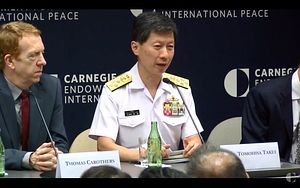Should China use the artificial islands it has built for military purposes, all of the South China Sea could be “covered by China’s sphere of military influence,” the commander of Japan’s Maritime Self-Defense Forces (JMSDF), Admiral Tomohisa Takei, warned in a speech delivered this Wednesday at the Carnegie Endowment for International Peace in Washington.
While calling for increased maritime cooperation in the region, Takei emphasized that problems between countries must be solved by peaceful means, international law and norms. “If one country ignores this and imposes its own interpretation of international law on its neighboring countries, freedom of navigation which is indispensable for an ocean of prosperity is threatened and unexpected incident at sea can occur as a result,” he added.
Deliberating on the U.S. presence in the region, he evaded a reporter’s question about whether Japan and the United States would conduct joint South China Sea naval patrols in the foreseeable future. However, he was adamant in arguing that a “U.S. presence is required for now and in the foreseeable future for peace and stability in the Indo-Pacific region.” Additionally, he emphasized that the South China Sea should remain “free and open waters.”
Discussing naval capabilities he said that “each navy in the region needs to adapt itself to a new strategic environment.” “I believe that Japan will make both personnel and material contribution toward capacity building,” he said. He also further elaborated on the JMSDF’s specific role and sketched out the expanding geographical scope of JMSDF operations:
Even though the Indian Ocean and the Western Pacific are geographically separated, they are so closely related that they cannot be separated both politically and economically. Therefore, we need to regard security in each of these two oceans as identical.
Addressing the burgeoning regional military buildup, Takei also noted that “flawed transparency” is causing “stress and anxiety” between neighboring states.
Interestingly, the same day Admiral Takei delivered his speech in Washington, Japan’s Ministry of Defense also published a short analysis of China’s building activities in the South China Sea on its website sketching out the military consequences of constructing artificial islands.
“Building port facilities of certain size capable of berthing, resupply and maintenance would enable China to maintain more robust naval and maritime law enforcement presence in the entire SCS [South China Sea],” the presentation states.
Additionally, the analysis explains:
Fiery Cross Reef with an airstrip and support facilities would enable China to forward-deploy various aerial platforms (incl. fighters, bombers and UAVs). Its ramifications may include:
China’s improved air power-projection capability over the entire SCS;
enhanced air superiority over the SCS;
improved A2/AD capabilities against U.S. intervention; and,
possible declaration of an “SCS Air Defense Identification Zone”.
“Sustained deployment of various platforms including naval and law enforcement ships as well as aircraft enabled by military base construction would dramatically improve China’s ISR [intelligence, surveillance, and reconnaissance] and other mission capabilities in the central and southern portions of the SCS,” the defense ministry’s power point presentation further elaborates.

































